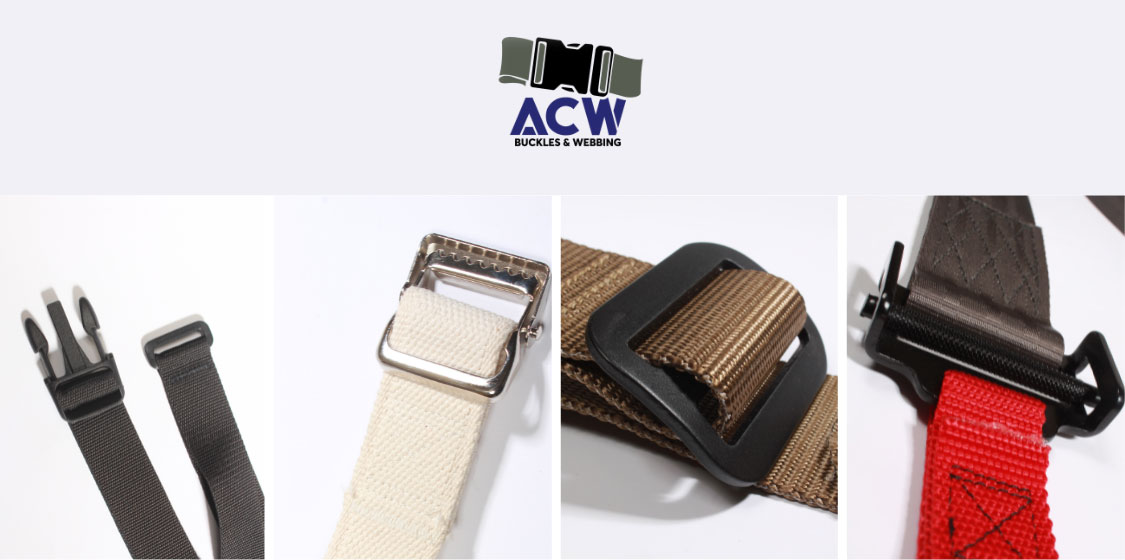Plastic Buckles vs Metal Hardware: When To Use Which
When it comes to fastening systems, the choice between plastic buckles and metal hardware isn’t just a matter of preference. The decision impacts safety, durability, weight, and overall performance. In industries ranging from military and aerospace to fire and rescue, marine, and industrial applications, the right buckle can make all the difference.
As a U.S based buckle manufacturer and webbing manufacturer, ACW produces both plastic and metal fastening solutions designed to meet demanding industry requirements. In this guide, we’ll compare plastic buckles to metal hardware, explore their advantages and limitations, and help you determine which is best for your application.
Plastic Buckles: Lightweight Versatility
Plastic buckles are widely used because of their balance of strength, weight, and versatility. High-quality plastics such as acetal provide durability while keeping components lightweight, making them ideal for applications where comfort and reduced bulk are important.
In military webbing applications, plastic buckles are often used in tactical gear where silent operation and reduced weight matter. For sporting goods, child safety products, and backpacks, plastic hardware provides a cost-effective and reliable fastening option. Plastic also resists corrosion, making it suitable for marine webbing and flotation gear because plastic does not rust.
However, plastic buckles have limitations. They are not always the best choice for extreme load-bearing applications. In these cases, metal hardware provides greater security and performance.
Learn more about ACW’s plastic buckles and fastening systems.
Metal Hardware: Strength and Durability
Metal hardware is the standard in applications where strength and long-term durability are essential. Metal is going to be stronger than plastic but metal hardware comes at a higher price point and there are less domestic options. Stainless steel, aluminum, and zinc components provide high load capacity and withstand extreme conditions. In some industrial straps, aerospace applications, and rescue gear, metal hardware ensures performance even under intense stress.
That said, metal hardware also comes with tradeoffs. It is heavier than plastic, which may reduce comfort in load-bearing tactical gear, and it may corrode in marine environments unless specially treated. For applications where weight and corrosion are critical factors, plastic is often preferred.
See ACW’s full line of straps engineered with high-strength hardware.
When to Use Plastic vs Metal Buckles
The best choice depends on your industry and application:
- Choose Plastic Buckles When:
- Weight reduction, corrosion resistance, or silent operation is needed. Ideal for tactical gear, backpacks, marine flotation devices, and child safety products.
- Choose Metal Hardware When:
- Maximum strength, heat resistance, or extreme durability is required. Ideal for aerospace, industrial tie-downs, military harnesses, and rescue equipment.
- Maximum strength, heat resistance, or extreme durability is required. Ideal for aerospace, industrial tie-downs, military harnesses, and rescue equipment.
As both a plastic buckle manufacturer and a metal hardware supplier, ACW can help you select the right fastening solution for your performance and safety requirements.
Industry Examples
- Military Applications: Tactical vests often use plastic buckles for comfort, but load-bearing harnesses typically require metal for strength.
- Aerospace: Metal hardware is favored due to extreme safety standards and heat resistance.
- Marine: Plastic resists corrosion in saltwater, but metal is used for heavy-load cargo restraint.
- Fire and Rescue: Flame-resistant webbing paired with metal buckles ensures safety in high-heat environments.
Industrial: Metal hardware dominates in heavy lifting and tie-down straps, while plastic is common for lightweight gear.
Why Work with ACW?
ACW manufactures U.S.-made buckles, webbing, and straps that meet the performance needs of multiple industries. Whether you need lightweight plastic buckles for marine applications or heavy-duty metal hardware for industrial and military use, we engineer fastening systems that balance safety, compliance, and durability.
Our Inventory Bank service ensures quick turnaround and consistent availability for critical projects. Explore our buckle options and discover why leading industries trust ACW as their buckle manufacturer of choice.
FAQs
Plastic buckles are strong enough for many applications, including tactical gear, marine flotation, and child safety. However, for extreme load-bearing or high-heat environments, metal is the superior choice.
High-quality acetal and engineered plastics resist cracking and wear, making them durable under normal use. Low-quality plastic buckles, however, may fail more quickly.
Yes. ACW manufactures a wide range of buckles and fasteners in both plastic and metal, tailored to the needs of military, aerospace, marine, and industrial applications.
Conclusion
Choosing between plastic buckles and metal hardware depends on the balance of strength, weight, environment, and safety requirements. Plastic excels in lightweight, corrosion-resistant, and comfort-focused applications, while metal delivers unmatched strength and heat resistance in extreme conditions.
By working with ACW, a U.S.-based plastic buckle manufacturer and metal hardware supplier, you can ensure your fastening systems are designed to meet your industry’s highest safety and performance standards. Contact us today to find the right solution for your needs.

